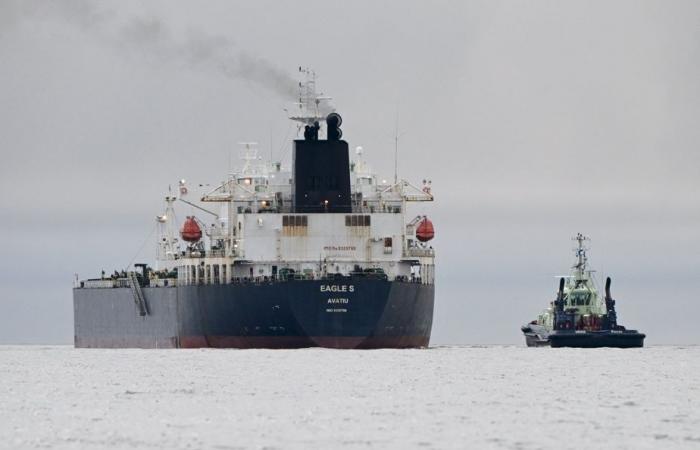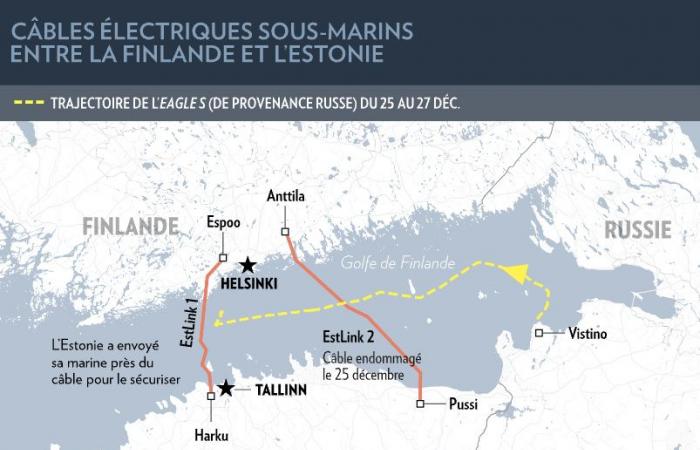On Christmas Day, an undersea electricity cable connecting Finland and Estonia broke down. The cause? On Saturday, Finnish authorities seized a Russian oil tanker flying the flag of the Cook Islands, which they suspect of being behind sabotage.
Published at 6:00 a.m.
What is the importance of the EstLink 2 connection, this electrical cable which broke down on December 25?
It is of great importance, even if its breakdown did not affect the electricity supply to the Finns, said the Prime Minister of Finland, Petteri Orpo, on Wednesday. Its repair could take seven months, according to national operator Fingrid. The cable is part of an extremely sophisticated network of submarine interconnections in Europe, according to the website of Nexans, one of the largest wire and cable companies in the world.
Among the advantages provided by these arteries: securing and balancing networks, transporting excess energy produced, but also reducing the price of electricity. This drop in price is explained in particular by the diversification of energy sources, which increases supply, and increased security of supply.
According to former Canadian diplomat Ferry de Kerckhove, now a professor at the Center for International Policy Studies at the University of Ottawa, the deliberate severing of these interconnections constitutes a new manifestation of a form of war. “These cables are of great importance in terms of data transmission and [leur rupture] can prevent you from living properly,” he recalls.
SOURCES: MARINETRAFFIC, FINGRID / CARTOGRAPHIC DATA: OSM
Estonia has also sent patrols at sea to protect its other electricity connection with Finland, the EstLink 1 link, to prevent this from happening.
Why do we suspect sabotage on the part of Russia?
Because the event could be the last to occur in the “hybrid” war that Russia and the NATO countries have been waging since the start of the war in Ukraine, explains Ferry de Kerckhove. “It is an intensification of the war which targets Ukraine, but which now also targets the Western world,” he observes.
Moreover, this is not the first event of this nature to occur in recent years. Just over a month ago, two telecommunications cables were severed in Swedish territorial waters in similar circumstances, and suspicion fell on a Chinese ship that was in the area at the time of the break.
This time it’s the oil ship Eagle Sof Russian origin, which is suspected of being at the origin of the incident and which would belong to the Russian “ghost fleet”. “This is certainly something that can be deliberate on the part of Russia,” said Mr. de Kerckhove. The day after the cable rupture, December 26, the boat was boarded and moved under escort to a town near Helsinki, before being seized during the day on Saturday.
What do we mean by “ghost fleet”?
A fleet of Russian ships that export oil illegally is called a “ghost fleet” because they circumvent sanctions imposed by some Western countries in response to Russia’s invasion of Ukraine, explains Mr. de Kerckhove. According to the British government, there were around 600 Russian ships in this fleet in July, and this phenomenon continues to grow.
This means that maritime power remains essential, underlines Mr. de Kerckhove. “It is essential to protect the cables, but also simply to provide additional surveillance for those who are basically trying to escape the sanctions that are imposed, in particular, on oil and gas,” adds- he.
L’Eagle S also includes all the characteristics of these boats. If confirmed, this would be the first known case of a Shadow Fleet ship being used to intentionally sabotage critical infrastructure in Europe.
What are the possible geopolitical consequences?
If the securing of the EstLink 1 cable will be ensured by Estonia, NATO announced on Friday that it would also strengthen its military presence in the Baltic Sea. Ferry de Kerckhove underlines that NATO members could also be tempted to strengthen the sanctions they have already imposed on Russia. This is what the European Union plans to do, it announced on Thursday.
She also condemned any deliberate destruction of Europe’s essential infrastructure. According to an analysis of New York Timesif sabotage were confirmed, it would be a clear escalation on Russia’s part in the conflict.
With Agence France-Presse and the New York Times







